Unit4 Don't eat in class! SetionA课件(87PPT无音视频)
文档属性
| 名称 | Unit4 Don't eat in class! SetionA课件(87PPT无音视频) |  | |
| 格式 | zip | ||
| 文件大小 | 6.2MB | ||
| 资源类型 | 教案 | ||
| 版本资源 | 人教新目标(Go for it)版 | ||
| 科目 | 英语 | ||
| 更新时间 | 2019-03-28 10:50:48 | ||
图片预览


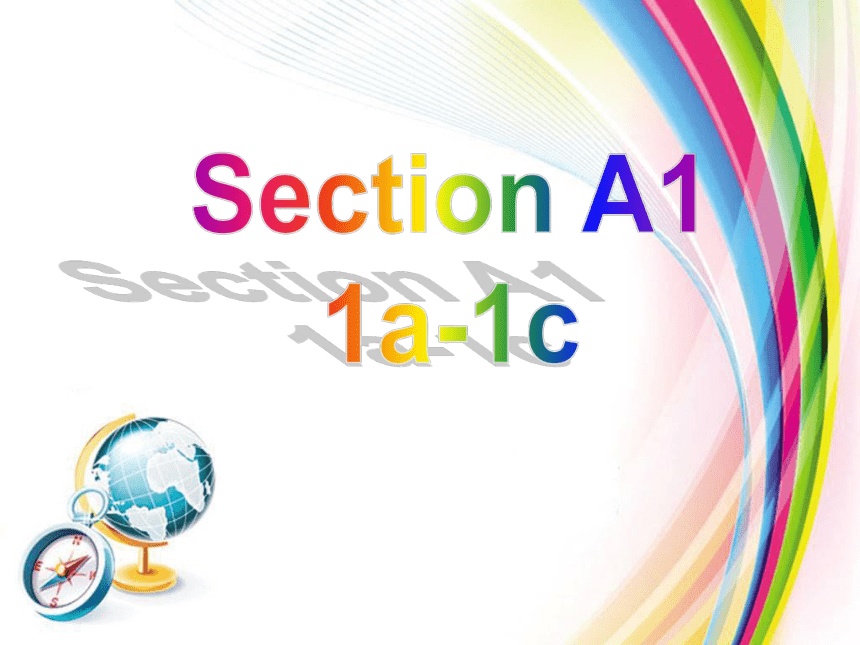
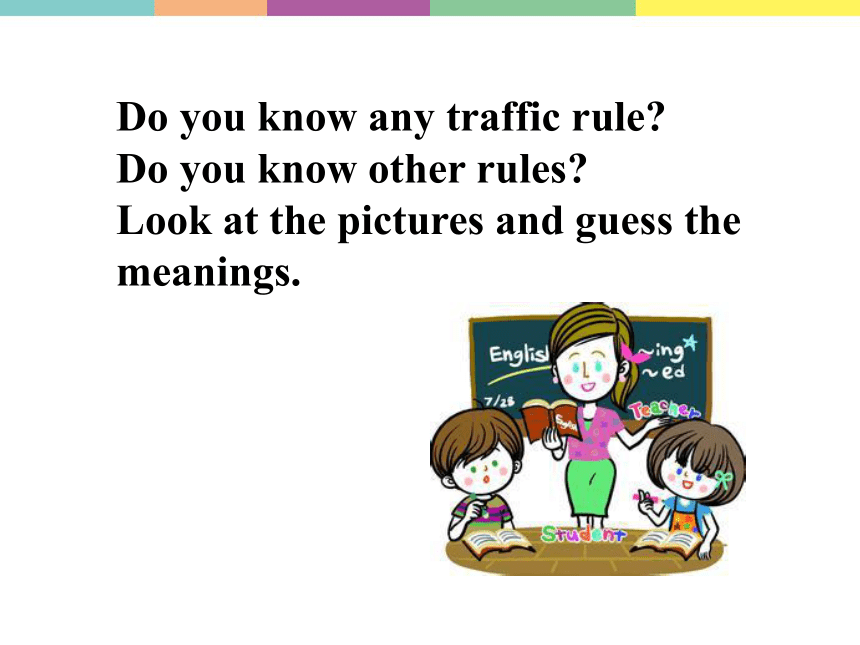
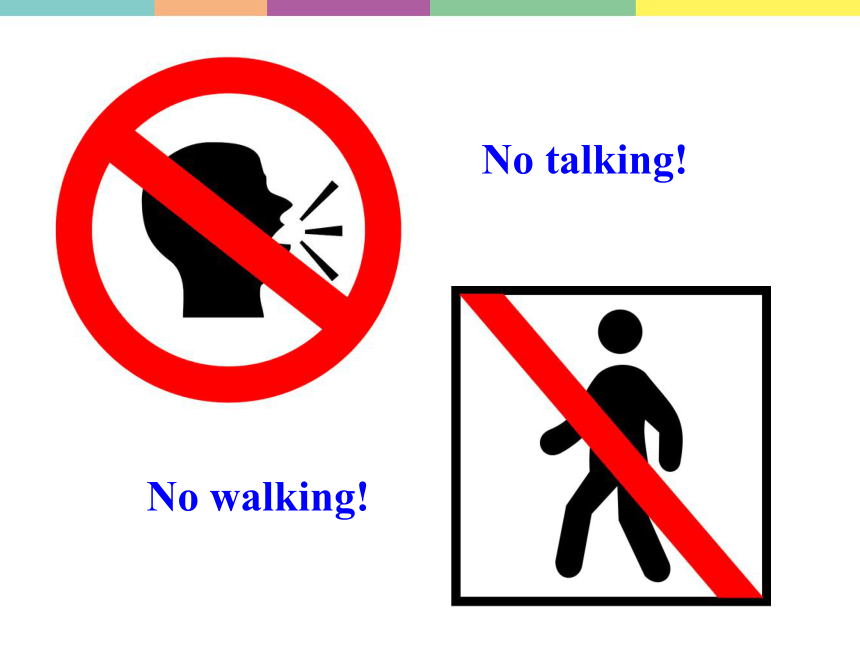
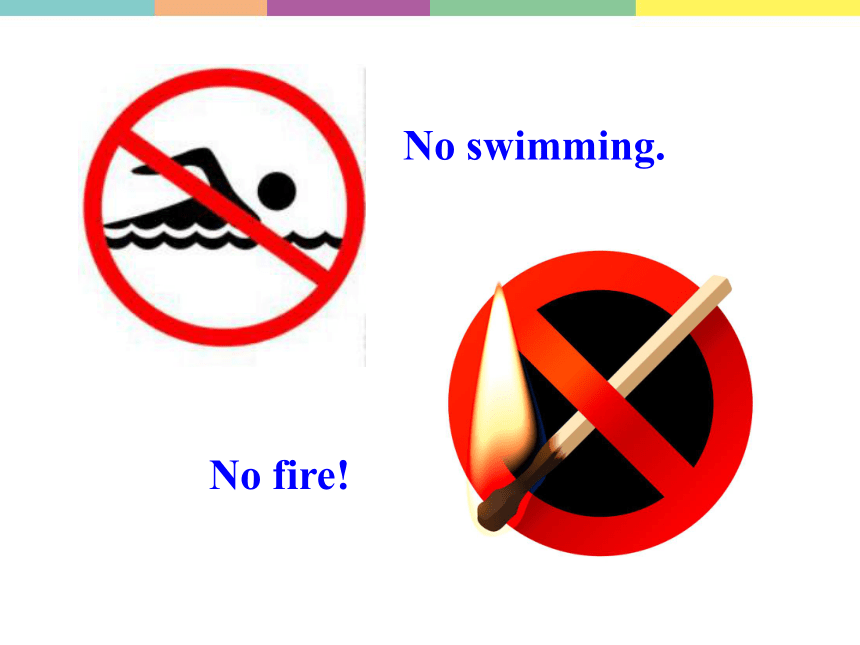
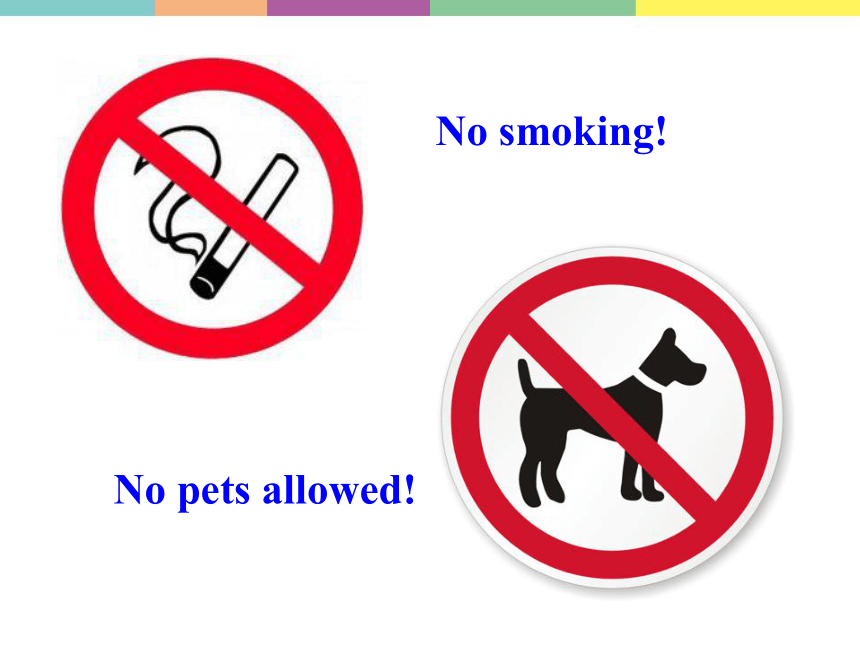
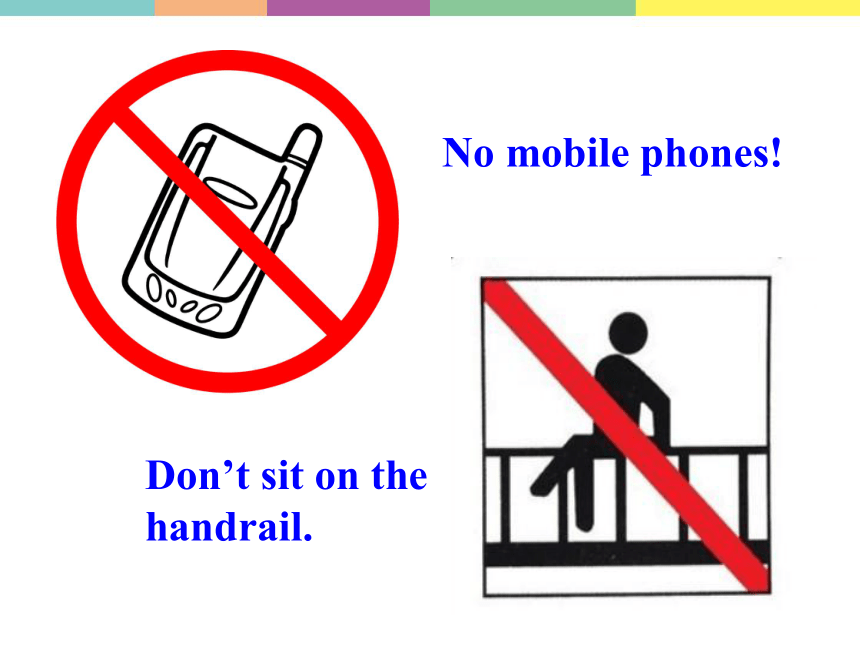
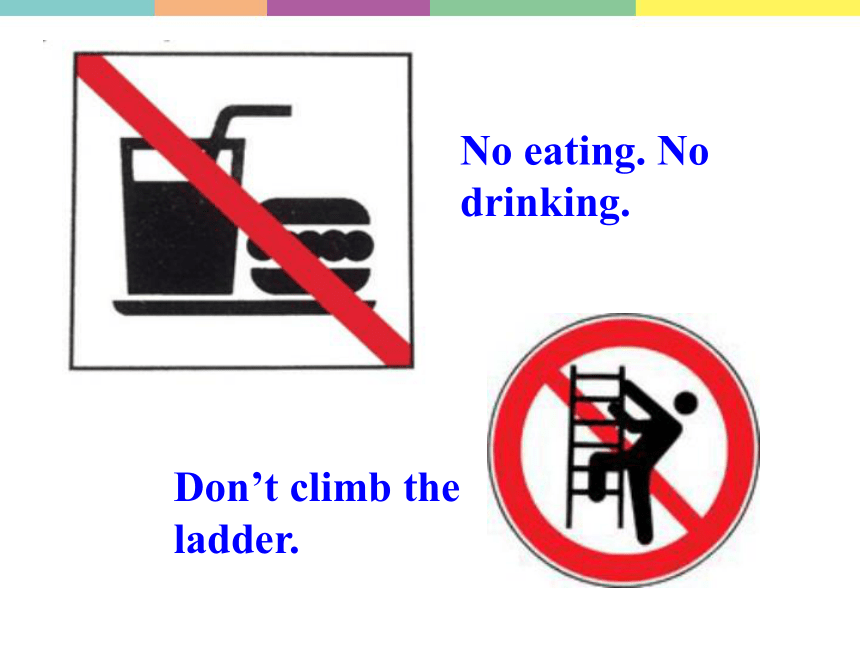
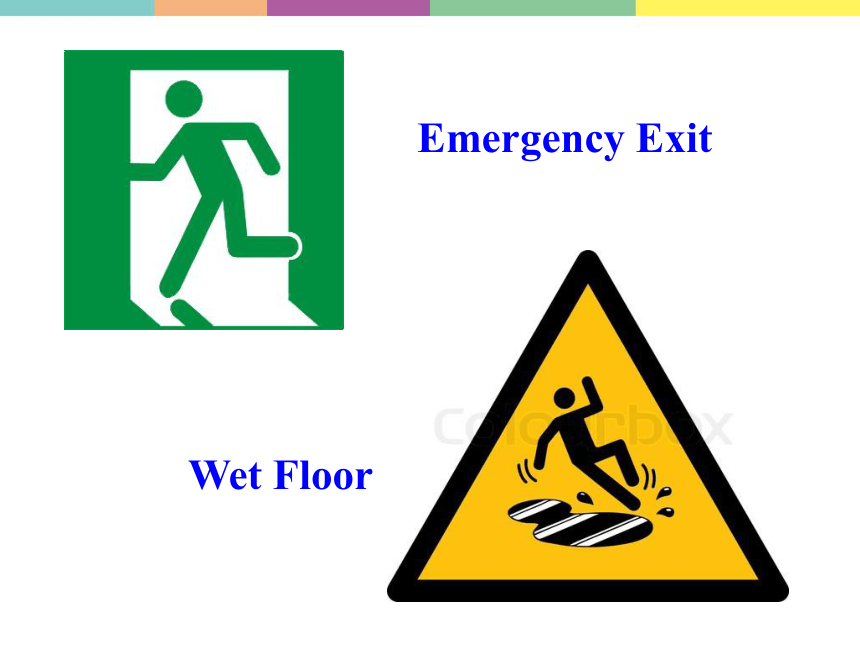
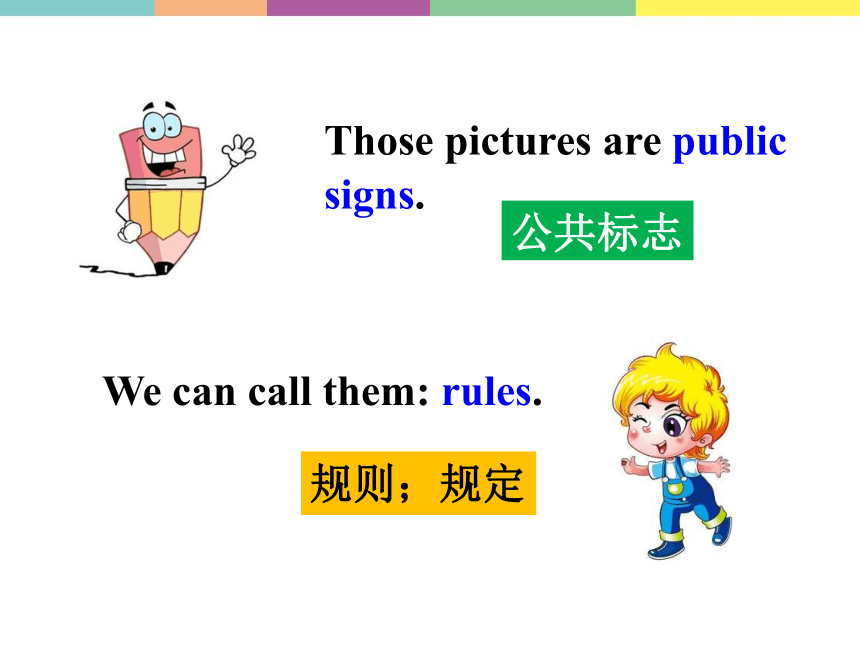
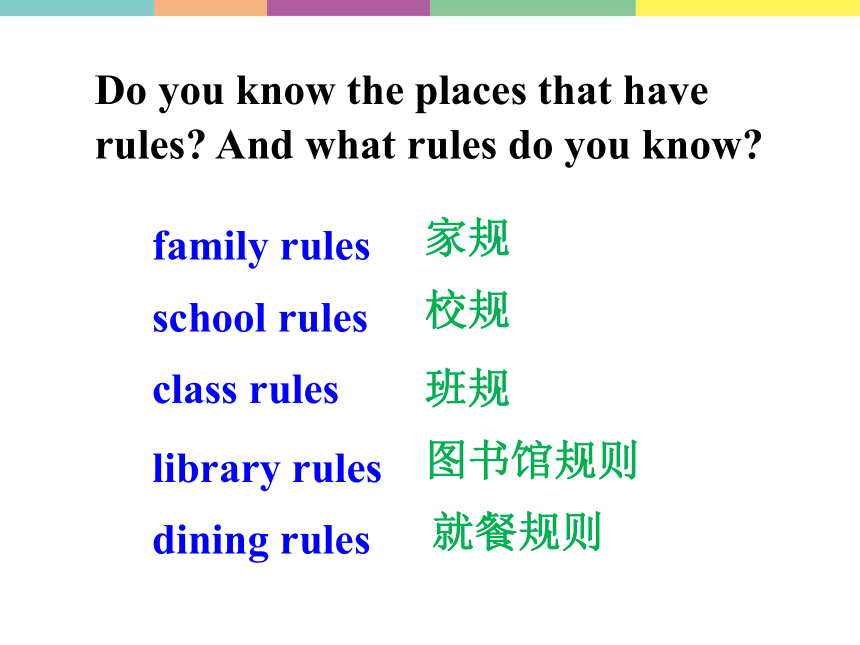
文档简介
Unit 4
Unit 4
Don't eat in class.
Section A1
1a-1c
Do you know any traffic rule?
Do you know other rules?
Look at the pictures and guess the meanings.
No talking!
No walking!
No swimming.
No?fire!
No?smoking!
No?pets allowed!
No mobile phones!
Don’t sit on the handrail.
No eating. No drinking.
Don’t climb the ladder.
Emergency Exit
Wet Floor
Those pictures are public signs.
We can call them: rules.
公共标志
规则;规定
school rules
class rules
family rules
library rules
dining rules
校规
班规
图书馆规则
就餐规则
家规
Do you know the places that have rules? And what rules do you know?
keep rules
break rules
遵守规则
违反规则
In our daily life(日常生活):
we have to
we can’t
What can we do at school?
What can’t we do at school?
A: Can we arrive late for class?
B: No, we can’t. We can’t arrive late for class. We must be on time.
be late for class = arrive late for class
Don’t be late for class.
Don’t eat in the classroom.
A: Can we eat in the classroom?
B: No, we can’t. We can’t eat in the classroom. We can eat in the dinning hall.
.
A: Can we run in the hallways?
B: No, we can’t. We can’t run
in the hallways.
Don’t run in the hallways.
A: Can we listen to music in class?
B: No, we can’t. We can’t listen to music in class.
Don’t listen to music in class.
Don’t fight.
A: Can you fight?
B: No, we can’t. We can’t fight.
Don't...
Memory Test:
Write the number of the rule next to the student.
2. Don’t run in the
hallways.
4. Don’t listen to
music in class.
5. Don’t fight.
1. Don’t arrive late for class. You must be on time.
3. Don’t eat in the
classroom. You must
eat in the dining hall.
Listen. What rules are these
students breaking? Write the
numbers after the names.
1b
Peter
____________________________
Amy
____________________________
Mike
____________________________
2. Don’t run in the hallways.
3. Don’t eat in the classroom.
4. Don’t listen to music in class.
Ms. Clark: Hey, Peter. You know the rules.
Don’t ___________________.
Peter: Sorry, Ms. Clark.
Mr. Smith: Amy, don’t ___________________.
You must eat in the dining hall.
Amy: Oh, sorry, Mr. Smith.
Mr. Smith: Hey, Mike, don’t ______________
in class. Mike!
Boy: He can’t hear you, Mr. Smith.
Listen again and complete the conversation.
run in the hallways
eat in the classroom
listen to music
祈使句的否定形式:
don’t +实义动词原形
“不要做……”
must:“必须” 强调说话人的主观看法,语气强烈
Well, we can’t arrive late for class. We must be on time.
Student A is a new student. Student B tells Student A about the rules above.
What are the rules?
Don’t run in the hallways.
1c
Don't arrive late for class.上课不要迟到。
知识点
1
考向一
【重点】
“Don't+动词原形”是祈使句的否定
形式,意为“不要……;禁止……”,相当于
“You mustn't+动词原形”。
eg:Don't be late for class next time.
下次上课不要迟到了。
Don't play football in the street.
不要在街上踢足球。
考向二
arrive late for与be late for的区别
arrive late for
都表示
“迟到” 侧重到达时间晚 Don't arrive late for the meeting next time.下次开会别迟到了。
侧重于状态 She is late for work every day. 她每天上班都迟到。
be late for
典例
Don't be late ________class! We must be on time. (成都)
A. for B. to C. in
A
You must be on time.你一定要准时。
知识点
2
考向一
must为情态动词,意为“必须,一定”。情态动词不能单独作谓语动词,必须和动词原形一起构成谓语。
eg: You must read a book before you watch TV.
在看电视前你必须读书。
(1)must modal verb 必须
The passengers ________ show their ID cards before getting on the plane.(株洲)
A.might B.must C.could
典例
B
【点拨】考查情态动词。might可能;must必须;could能,
可以。句意:乘客在登机前必须出示他们的身份证。
考向二
must用于否定句时,mustn't意为“不允许,禁止”,而不表示“不必”。
eg: You mustn't be late for school.
你千万不要上学迟到。
典例
Children ________ sit in the front(前面) seat of a car. It's too dangerous(危险).
A.need B.needn't C.must D.mustn't
D
【点拨】 考查情态动词。mustn't 表“禁止”。句意:
孩子禁止坐在小汽车的前座上,那太危险了。
考向三
以must开头的一般疑问句,若作否定回答,
可以用needn't或don't have to,不用mustn't。
eg: —Must I clean all the rooms?
我必须打扫所有的房间吗?
—No,you needn’t/don’t have to. 不,你不必。
典例
—Must I hand in(上交) my homework now,
Mr. Smith?
—No, you ________. (北京)
A.can't B.shouldn't
C.wouldn't D.needn't
D
(2)on time意为“准时;按时”,指在规定的时
刻发生。
eg: We can't finish the work on time without his help.
没有他的帮忙,我们不能按时完成工作。
考向
辨析on time与in time
on time 准时(在规定的时间之内) 表示动作在规定时间内或比规定时间提前发生。
in time 及时(恰在时间点上) 强调与某个时刻一致。
魔法记忆
She didn't catch the bus in time,so she couldn't arrive there on time.
她没有及时赶上公共汽车,因此她不能准时到那里。
典例
The teachers hope all of us can hand ________ our homework ________ time every day. (黄石)
A.up; in B.out; on
C.on; in D.in; on
D
【点拨】考查介词的用法。hand in 上交;on time 按时;
in time 及时。句意:老师希望我们所有人每天都能按时
交作业。故选D。
Don't listen to music in class.
不要在课堂上听音乐。
考向一
知识点
3
①listen to music意为“听音乐”,其中listen
为不及物动词,其后接宾语时,要加介词to。
eg: Listen!The girl is singing.
听!那个女孩正在唱歌。
Listen to the teacher carefully, please.
请认真听老师讲课。
②辨析listen和hear
listen 不及物动词 后接宾语时,要加介词to,侧重于“听”的动作
This girl likes to listen to the radio.这个女孩喜欢听收音机。
hear 及物动词
强调“听”的
结果
Can you hear anything?
你能听到什么吗?
典例
We all ________ the man carefully(仔细), but we can't ________what he says.
A.listen to; listen to B.listen to; hear
C.hear; listen to D.hear; hear
B
【点拨】 listen to“听”,强调动作;hear“听到”,强调
结果。句意:我们都在仔细听那个人说,但是没听见他说
什么。所以选B。
①in class是固定短语,意为“在课上;上课时”,
after class意为“在课下;下课后”。
②辨析in class和in the class
in class 在课上;上课时 Do you listen to your teacher carefully in class?你在课上认真听老师讲课吗?
in the class 在这个班 There are forty students in the class.
这个班有40名学生。
考向二
拓展
有类似用法的还有:
①in hospital 住院 in the hospital 在医院里
②at table 吃饭 at the table 在桌子旁
4. Don’t arrive late for class.
arrive vi. 到达= get (to)
arrive后接表示地点的副词时,则不需要用介词。
e.g. 她经常晚上7: 30到家。(翻译)
She often arrives home at 7:30 in
the evening.
e.g. They ___________ Beijing at six.
他们六点钟到的北京。
We usually __________ the train
station in the morning.
我们一般在早上到达火车站。
arrived in
arrive at
arrive要表示“到达某地”,后需加介词at (一般用于较小的地点)或in (一般用于较大的地点) 。
【链接】get to也可表示“到达某地”。
e.g. I usually get to school by bike.(翻译)
我通常骑自行车上学。
注意: arrive和get后接here, there, home之类的副词时,不加介词。
e.g. When do you usually arrive / get
home?
I usually arrive / get here at noon.
1) My mother usually get ___ school at 7:40 in the morning.
2) When do you usually arrive ____ the bus station?
3) Jenny’s uncle usually arrives ___ Shanghai in the evening.
【运用】
I. 选词填空: in, at, to
to
in
at
II. 根据句意选用get或arrive填空,有的
需要变换形式。
1) David _____ to?London?last week.
2) Yesterday the man __________ at the airport on time.
3) We ____________ here at five o’clock yesterday.
got??
arrived??
arrived / got
Ⅲ.【运用】汉译英。
1)?到这儿花费你多长时间?
2)?这架飞机每周三到达北京。
3)?我能在下午三点到达车站。
How long does it take you to arrive / get here?
This plane arrives in / gets to?Beijing?
every Wednesday.
I can arrive at / get to the station at 3:00 p.m.
5. Don’t fight.
fight v. 打架; 战斗; 争吵
1) 作及物动词
e.g. You can fight him, but can you
beat him? 你可以打他,但是你能
打得过他吗?
2) 作不及物动词
fight with意为“和……打架/争辩”;?
fight for意为“为……打架/争辩”
e.g. 他们为祖国而战。
They ______________________.
杰克从不和他的弟弟打架。
Jack never ____________________.
fought for their country
fights with his brother
3) 作名词, 意为“打架; 争吵”, 常用词组have a fight“打架; 吵架”
e.g. 你和她吵过架吗? (翻译)
Did you have a fight with her?
Observe and learn.
Don’t eat in the classroom.
Don’t fight.
Don’t run in the hallways.
Don’t arrive late for class.
Don’t listen to music in class.
Have a think:
祈使句是怎样构成的?
一般在什么情况下会用祈使句?
Don’t …
不要做……
祈使句一般用来表示请求、命令、劝说、号召、警告等。
在祈使句中, 通常省略第二人称主语you。肯定式以动词原形开头,否定式一般在动词原形前加don’t。
祈使句
一、祈使句的肯定式
1. 以行为动词原形开头,简称Do型。
e.g. Come here. 到这儿来。
2. 以动词be开头,简称Be型。
e.g. Be quiet, please. 请安静。
3. 以Let开头,简称Let型。
e.g. Let’s go! 咱们走吧!
注意:
有时可在祈使句的句首或句尾加上please,使语气显得客气、有礼貌。如果在句尾加please,应该用逗号与前句隔开。
e.g. Go this way, please. 请这边走。
二、祈使句的否定式
1. Do型和Be型的否定式是在句首加don’t。
e.g. Don’t sit here. 不要坐在这儿。
Don’t be late. 别迟到。
2. 以let开头的祈使句,其否定式有两种:
一种是直接在句首加don’t,另一种是 “let +宾语+not +动词原形+ (其他)”。
e.g. Don’t let him go. 不要让他走。
Let’s not go there. 咱们别去那儿。
注意:
“No+名词/动词?ing形式”表示禁止或规劝,常用于公共场所。
e.g. No photos! 禁止拍照!
No smoking!?????? 禁止吸烟!
【运用】汉译英。
1.?请看图片,Jim!
2.?不要在晚饭后吃冰激凌。
3.?在图书馆里请保持安静。
Be good to friends.
Let me help you.
Don’t fight with your friend(s).
4.?对朋友们要好。
5.?让我帮助你。
6.?不要和你的朋友打架。
Be good to friends.
Let me help you.
Don’t fight with your friend(s).
根据语境及提示写出所缺单词或短语。
1. Mr. Jones has many _________ (规则) in his sports club.
2. Usually Ms. Clark _________ (到达) at school very early.
3. At school Simon never _________ (打架) with his classmates.
4. I’m _________ (抱歉的) I can’t help you with your math.
rules
arrives
fights
sorry
5. Many students are in the _________ (走廊).
6. _________ (听) me! We don’t have much time.
7. Come on,?Alice! We must get to school _________ (按时).
8. —Where’s Jane?
—She’s in the _________ (餐厅).
hallways
Listen to
on time
dining hall
Let's start from the little things.
Keep the school rules first.
我们从遵守校规做起!
We can't rule a country without rules.
1. Write down more rules you know
in your school. (at least 5)
2. Preview Grammar Focus.
Section A1
2a-2d
What are the rules?
We can’t arrive late for class. We must be on time.
We can’t run in the hallways.
We can’t eat in the classroom. We must eat in the dining hall.
We can’t listen to music in class.
We can’t fight.
Look at the table. There are eight activities. Read the phrases and guess what your classmates can do and what they can’t do?
Pre-listening
Listen. Check (√) the activities
Alan and Cindy talk about.
2a
√
√
√
√
√
√
2b
Listen again. Can Alan and Cindy do these activities? Circle can or can’t above.
听力原文
情态动词can表许可,否定式为can’t,表禁止
We can’t listen to music in the classroom or hallways.
But we can listen to music in music room.
Student A is Alan and Student B is Cindy. Talk about the rules in 2a.
Can we listen to music?
We can’t eat in the classroom, but we can eat in the dining hall.
Can we eat in the classroom?
2c
No, we can’t. What else? Oh, we can’t fight with the classmates. That makes the teachers really unhappy.
Oh, can we wear a hat in class?
I see…
When you go to a new school, you must know about the school rules.
Today is John’s first day at school. Let’s see some rules in his new school.
2d
1. What are John and Alice talking about?
_____________
2. How many rules does Alice mention?
______________
School rules.
Four rules.
Read the dialogue in 2d and answer the questions.
3. Is John new at school?
___________
4. Are there many rules at school?
______________
5. Can he bring music players to school?
_______________
6. Do they have to always wear the school
uniform? _______________
Yes, he is.
Yes, there are.
No, he can’t.
Yes, they do.
What are some of the rules?
Dos Don’ts
Wear the school uniform.
Be quiet in the library.
Don’t be late for school.
Don’t bring music players to school.
1. But we can listen to it outside or in the music room.
outside
① 作副词, 意为“在外面, 向外面”, 常单独作状语e.g. We can’t eat in the classroom, but we can eat outside.
② 作介词, 意为“在……的外面”, outside + 表示地点或处所的名词
Mike is sitting outside the house.
outside
③ 作形容词, 意为“外面的”
e.g. Outside workers need warm clothes.
④ 作名词, 意为“外部”
e.g. The outside of the house is red.
2. And we always have to wear the
school uniform.
wear v. 意为“穿、戴”,表示状态
e.g. 我姑姑穿着蓝色的裙子, 白色的T恤。
他戴眼镜吗? (翻译)
My aunt wears a blue skirt and a white T-shirt.
Does he wear glasses?
3. Can we bring music players to school?
bring: 从别处拿/带某物到说话者所在
的地方
take: 从说话者所在的地方拿/ 带某物到
别处
e.g. 把它拿到厨房去。(翻译)
Take it to the kitchen.
【选词填空】
Can you ______ (take / bring) your photos
to us when you come next week?
bring
4. can & must & have to
can表示许可,“可以”,否定形式can’t表禁止,“不可以”。
must通常表示说话人的主观看法,“必须”,其否定形式为mustn’t,“不准;禁止”。
have to表“必须”时与must意义接近,有时可与must互换,但have to所表示的“必须”更侧重于客观需要。have to可用在不同时态中,有人称和数的变化,一般现在时的否定形式为don’t / doesn’t have to,“不必”。
【运用】完成句子。
1)?你今晚不可以看电视。
You ___________________ this evening.
2)?我们必须按时到达机场。
We __________________________ the airport on time.
3)?你早晨不必起那么早。
You ___________________ so early in the morning.
can’t watch TV
must/have to arrive at/get to
don’t have to get up
注: 另附word文档。
点击此处链接
根据句意及汉语提示填入恰当的单词。
1. We have a lot of _____ (规则) in our
school.
2. Ms. Green never______ (到达) late for
work.
3. Come in. It’s cold _______ (在外面).
4. I think it’s _________ (重要的) to learn
English well.
5. We have to _____ (穿) sports shoes for
P.E. classes.
rules
arrives
outside
important
wear
6. John often ________(打架) with his
brother because of little things.
7. There is a big dining ____ (大厅) in
our school, and we eat lunch there.
8. It’s raining _______(在外面). Just stay
at home.
fights
hall
outside
1. We have to be ______ in the school
library.
2. Mike, don’t _____with your friends.
3. — Mum, where’s my CD ______?
— Oh, it’s in your bookcase.
4. I’m _____ I can’t go with you. I have
to do my homework.
5. — Can I _____ my dog to school?
— No, you can’t.
quiet
fight
player
sorry
bring
从方框中选择适当的单词并用其正确形
式填空。
fight, play, quiet, bring, sorry
按要求改写句子,每空一词。
1. Paul has to eat outside.
(改为一般疑问句)
_____ Paul _____ ___ eat outside?
2. They can wear hats in the hall.
(改为一般疑问句)
_____ they _____ hats in the hall?
3. The students have to wear sports shoes
for gym class. (对划线部分提问)
______ do the students _____ ___ ___?
Does have to
Can wear
What have to do
4. You can’t stand in the middle of the
street. (改为祈使句)
_____ ______ in the middle of the street.
5. Take the pen to your sister. (改为否定句)
______ ______ the pen to your sister.
6. Don’t arrive late next time. (改为同义句)
_______ ____ late next time.
Don’t be
Don’t stand
Don’t take
Translate and write them down.
1. 你们学校的校规是什么?
2. 不要在教室听音乐。
3. 我们上课不能迟到。
Don’t listen to music in the
classroom.
What are your school rules?
We can’t arrive late for class.
1. Write down more rules you know
in your school. (at least 5)
2. Preview Grammar Focus.
Unit 4
Don't eat in class.
Section A1
1a-1c
Do you know any traffic rule?
Do you know other rules?
Look at the pictures and guess the meanings.
No talking!
No walking!
No swimming.
No?fire!
No?smoking!
No?pets allowed!
No mobile phones!
Don’t sit on the handrail.
No eating. No drinking.
Don’t climb the ladder.
Emergency Exit
Wet Floor
Those pictures are public signs.
We can call them: rules.
公共标志
规则;规定
school rules
class rules
family rules
library rules
dining rules
校规
班规
图书馆规则
就餐规则
家规
Do you know the places that have rules? And what rules do you know?
keep rules
break rules
遵守规则
违反规则
In our daily life(日常生活):
we have to
we can’t
What can we do at school?
What can’t we do at school?
A: Can we arrive late for class?
B: No, we can’t. We can’t arrive late for class. We must be on time.
be late for class = arrive late for class
Don’t be late for class.
Don’t eat in the classroom.
A: Can we eat in the classroom?
B: No, we can’t. We can’t eat in the classroom. We can eat in the dinning hall.
.
A: Can we run in the hallways?
B: No, we can’t. We can’t run
in the hallways.
Don’t run in the hallways.
A: Can we listen to music in class?
B: No, we can’t. We can’t listen to music in class.
Don’t listen to music in class.
Don’t fight.
A: Can you fight?
B: No, we can’t. We can’t fight.
Don't...
Memory Test:
Write the number of the rule next to the student.
2. Don’t run in the
hallways.
4. Don’t listen to
music in class.
5. Don’t fight.
1. Don’t arrive late for class. You must be on time.
3. Don’t eat in the
classroom. You must
eat in the dining hall.
Listen. What rules are these
students breaking? Write the
numbers after the names.
1b
Peter
____________________________
Amy
____________________________
Mike
____________________________
2. Don’t run in the hallways.
3. Don’t eat in the classroom.
4. Don’t listen to music in class.
Ms. Clark: Hey, Peter. You know the rules.
Don’t ___________________.
Peter: Sorry, Ms. Clark.
Mr. Smith: Amy, don’t ___________________.
You must eat in the dining hall.
Amy: Oh, sorry, Mr. Smith.
Mr. Smith: Hey, Mike, don’t ______________
in class. Mike!
Boy: He can’t hear you, Mr. Smith.
Listen again and complete the conversation.
run in the hallways
eat in the classroom
listen to music
祈使句的否定形式:
don’t +实义动词原形
“不要做……”
must:“必须” 强调说话人的主观看法,语气强烈
Well, we can’t arrive late for class. We must be on time.
Student A is a new student. Student B tells Student A about the rules above.
What are the rules?
Don’t run in the hallways.
1c
Don't arrive late for class.上课不要迟到。
知识点
1
考向一
【重点】
“Don't+动词原形”是祈使句的否定
形式,意为“不要……;禁止……”,相当于
“You mustn't+动词原形”。
eg:Don't be late for class next time.
下次上课不要迟到了。
Don't play football in the street.
不要在街上踢足球。
考向二
arrive late for与be late for的区别
arrive late for
都表示
“迟到” 侧重到达时间晚 Don't arrive late for the meeting next time.下次开会别迟到了。
侧重于状态 She is late for work every day. 她每天上班都迟到。
be late for
典例
Don't be late ________class! We must be on time. (成都)
A. for B. to C. in
A
You must be on time.你一定要准时。
知识点
2
考向一
must为情态动词,意为“必须,一定”。情态动词不能单独作谓语动词,必须和动词原形一起构成谓语。
eg: You must read a book before you watch TV.
在看电视前你必须读书。
(1)must modal verb 必须
The passengers ________ show their ID cards before getting on the plane.(株洲)
A.might B.must C.could
典例
B
【点拨】考查情态动词。might可能;must必须;could能,
可以。句意:乘客在登机前必须出示他们的身份证。
考向二
must用于否定句时,mustn't意为“不允许,禁止”,而不表示“不必”。
eg: You mustn't be late for school.
你千万不要上学迟到。
典例
Children ________ sit in the front(前面) seat of a car. It's too dangerous(危险).
A.need B.needn't C.must D.mustn't
D
【点拨】 考查情态动词。mustn't 表“禁止”。句意:
孩子禁止坐在小汽车的前座上,那太危险了。
考向三
以must开头的一般疑问句,若作否定回答,
可以用needn't或don't have to,不用mustn't。
eg: —Must I clean all the rooms?
我必须打扫所有的房间吗?
—No,you needn’t/don’t have to. 不,你不必。
典例
—Must I hand in(上交) my homework now,
Mr. Smith?
—No, you ________. (北京)
A.can't B.shouldn't
C.wouldn't D.needn't
D
(2)on time意为“准时;按时”,指在规定的时
刻发生。
eg: We can't finish the work on time without his help.
没有他的帮忙,我们不能按时完成工作。
考向
辨析on time与in time
on time 准时(在规定的时间之内) 表示动作在规定时间内或比规定时间提前发生。
in time 及时(恰在时间点上) 强调与某个时刻一致。
魔法记忆
She didn't catch the bus in time,so she couldn't arrive there on time.
她没有及时赶上公共汽车,因此她不能准时到那里。
典例
The teachers hope all of us can hand ________ our homework ________ time every day. (黄石)
A.up; in B.out; on
C.on; in D.in; on
D
【点拨】考查介词的用法。hand in 上交;on time 按时;
in time 及时。句意:老师希望我们所有人每天都能按时
交作业。故选D。
Don't listen to music in class.
不要在课堂上听音乐。
考向一
知识点
3
①listen to music意为“听音乐”,其中listen
为不及物动词,其后接宾语时,要加介词to。
eg: Listen!The girl is singing.
听!那个女孩正在唱歌。
Listen to the teacher carefully, please.
请认真听老师讲课。
②辨析listen和hear
listen 不及物动词 后接宾语时,要加介词to,侧重于“听”的动作
This girl likes to listen to the radio.这个女孩喜欢听收音机。
hear 及物动词
强调“听”的
结果
Can you hear anything?
你能听到什么吗?
典例
We all ________ the man carefully(仔细), but we can't ________what he says.
A.listen to; listen to B.listen to; hear
C.hear; listen to D.hear; hear
B
【点拨】 listen to“听”,强调动作;hear“听到”,强调
结果。句意:我们都在仔细听那个人说,但是没听见他说
什么。所以选B。
①in class是固定短语,意为“在课上;上课时”,
after class意为“在课下;下课后”。
②辨析in class和in the class
in class 在课上;上课时 Do you listen to your teacher carefully in class?你在课上认真听老师讲课吗?
in the class 在这个班 There are forty students in the class.
这个班有40名学生。
考向二
拓展
有类似用法的还有:
①in hospital 住院 in the hospital 在医院里
②at table 吃饭 at the table 在桌子旁
4. Don’t arrive late for class.
arrive vi. 到达= get (to)
arrive后接表示地点的副词时,则不需要用介词。
e.g. 她经常晚上7: 30到家。(翻译)
She often arrives home at 7:30 in
the evening.
e.g. They ___________ Beijing at six.
他们六点钟到的北京。
We usually __________ the train
station in the morning.
我们一般在早上到达火车站。
arrived in
arrive at
arrive要表示“到达某地”,后需加介词at (一般用于较小的地点)或in (一般用于较大的地点) 。
【链接】get to也可表示“到达某地”。
e.g. I usually get to school by bike.(翻译)
我通常骑自行车上学。
注意: arrive和get后接here, there, home之类的副词时,不加介词。
e.g. When do you usually arrive / get
home?
I usually arrive / get here at noon.
1) My mother usually get ___ school at 7:40 in the morning.
2) When do you usually arrive ____ the bus station?
3) Jenny’s uncle usually arrives ___ Shanghai in the evening.
【运用】
I. 选词填空: in, at, to
to
in
at
II. 根据句意选用get或arrive填空,有的
需要变换形式。
1) David _____ to?London?last week.
2) Yesterday the man __________ at the airport on time.
3) We ____________ here at five o’clock yesterday.
got??
arrived??
arrived / got
Ⅲ.【运用】汉译英。
1)?到这儿花费你多长时间?
2)?这架飞机每周三到达北京。
3)?我能在下午三点到达车站。
How long does it take you to arrive / get here?
This plane arrives in / gets to?Beijing?
every Wednesday.
I can arrive at / get to the station at 3:00 p.m.
5. Don’t fight.
fight v. 打架; 战斗; 争吵
1) 作及物动词
e.g. You can fight him, but can you
beat him? 你可以打他,但是你能
打得过他吗?
2) 作不及物动词
fight with意为“和……打架/争辩”;?
fight for意为“为……打架/争辩”
e.g. 他们为祖国而战。
They ______________________.
杰克从不和他的弟弟打架。
Jack never ____________________.
fought for their country
fights with his brother
3) 作名词, 意为“打架; 争吵”, 常用词组have a fight“打架; 吵架”
e.g. 你和她吵过架吗? (翻译)
Did you have a fight with her?
Observe and learn.
Don’t eat in the classroom.
Don’t fight.
Don’t run in the hallways.
Don’t arrive late for class.
Don’t listen to music in class.
Have a think:
祈使句是怎样构成的?
一般在什么情况下会用祈使句?
Don’t …
不要做……
祈使句一般用来表示请求、命令、劝说、号召、警告等。
在祈使句中, 通常省略第二人称主语you。肯定式以动词原形开头,否定式一般在动词原形前加don’t。
祈使句
一、祈使句的肯定式
1. 以行为动词原形开头,简称Do型。
e.g. Come here. 到这儿来。
2. 以动词be开头,简称Be型。
e.g. Be quiet, please. 请安静。
3. 以Let开头,简称Let型。
e.g. Let’s go! 咱们走吧!
注意:
有时可在祈使句的句首或句尾加上please,使语气显得客气、有礼貌。如果在句尾加please,应该用逗号与前句隔开。
e.g. Go this way, please. 请这边走。
二、祈使句的否定式
1. Do型和Be型的否定式是在句首加don’t。
e.g. Don’t sit here. 不要坐在这儿。
Don’t be late. 别迟到。
2. 以let开头的祈使句,其否定式有两种:
一种是直接在句首加don’t,另一种是 “let +宾语+not +动词原形+ (其他)”。
e.g. Don’t let him go. 不要让他走。
Let’s not go there. 咱们别去那儿。
注意:
“No+名词/动词?ing形式”表示禁止或规劝,常用于公共场所。
e.g. No photos! 禁止拍照!
No smoking!?????? 禁止吸烟!
【运用】汉译英。
1.?请看图片,Jim!
2.?不要在晚饭后吃冰激凌。
3.?在图书馆里请保持安静。
Be good to friends.
Let me help you.
Don’t fight with your friend(s).
4.?对朋友们要好。
5.?让我帮助你。
6.?不要和你的朋友打架。
Be good to friends.
Let me help you.
Don’t fight with your friend(s).
根据语境及提示写出所缺单词或短语。
1. Mr. Jones has many _________ (规则) in his sports club.
2. Usually Ms. Clark _________ (到达) at school very early.
3. At school Simon never _________ (打架) with his classmates.
4. I’m _________ (抱歉的) I can’t help you with your math.
rules
arrives
fights
sorry
5. Many students are in the _________ (走廊).
6. _________ (听) me! We don’t have much time.
7. Come on,?Alice! We must get to school _________ (按时).
8. —Where’s Jane?
—She’s in the _________ (餐厅).
hallways
Listen to
on time
dining hall
Let's start from the little things.
Keep the school rules first.
我们从遵守校规做起!
We can't rule a country without rules.
1. Write down more rules you know
in your school. (at least 5)
2. Preview Grammar Focus.
Section A1
2a-2d
What are the rules?
We can’t arrive late for class. We must be on time.
We can’t run in the hallways.
We can’t eat in the classroom. We must eat in the dining hall.
We can’t listen to music in class.
We can’t fight.
Look at the table. There are eight activities. Read the phrases and guess what your classmates can do and what they can’t do?
Pre-listening
Listen. Check (√) the activities
Alan and Cindy talk about.
2a
√
√
√
√
√
√
2b
Listen again. Can Alan and Cindy do these activities? Circle can or can’t above.
听力原文
情态动词can表许可,否定式为can’t,表禁止
We can’t listen to music in the classroom or hallways.
But we can listen to music in music room.
Student A is Alan and Student B is Cindy. Talk about the rules in 2a.
Can we listen to music?
We can’t eat in the classroom, but we can eat in the dining hall.
Can we eat in the classroom?
2c
No, we can’t. What else? Oh, we can’t fight with the classmates. That makes the teachers really unhappy.
Oh, can we wear a hat in class?
I see…
When you go to a new school, you must know about the school rules.
Today is John’s first day at school. Let’s see some rules in his new school.
2d
1. What are John and Alice talking about?
_____________
2. How many rules does Alice mention?
______________
School rules.
Four rules.
Read the dialogue in 2d and answer the questions.
3. Is John new at school?
___________
4. Are there many rules at school?
______________
5. Can he bring music players to school?
_______________
6. Do they have to always wear the school
uniform? _______________
Yes, he is.
Yes, there are.
No, he can’t.
Yes, they do.
What are some of the rules?
Dos Don’ts
Wear the school uniform.
Be quiet in the library.
Don’t be late for school.
Don’t bring music players to school.
1. But we can listen to it outside or in the music room.
outside
① 作副词, 意为“在外面, 向外面”, 常单独作状语e.g. We can’t eat in the classroom, but we can eat outside.
② 作介词, 意为“在……的外面”, outside + 表示地点或处所的名词
Mike is sitting outside the house.
outside
③ 作形容词, 意为“外面的”
e.g. Outside workers need warm clothes.
④ 作名词, 意为“外部”
e.g. The outside of the house is red.
2. And we always have to wear the
school uniform.
wear v. 意为“穿、戴”,表示状态
e.g. 我姑姑穿着蓝色的裙子, 白色的T恤。
他戴眼镜吗? (翻译)
My aunt wears a blue skirt and a white T-shirt.
Does he wear glasses?
3. Can we bring music players to school?
bring: 从别处拿/带某物到说话者所在
的地方
take: 从说话者所在的地方拿/ 带某物到
别处
e.g. 把它拿到厨房去。(翻译)
Take it to the kitchen.
【选词填空】
Can you ______ (take / bring) your photos
to us when you come next week?
bring
4. can & must & have to
can表示许可,“可以”,否定形式can’t表禁止,“不可以”。
must通常表示说话人的主观看法,“必须”,其否定形式为mustn’t,“不准;禁止”。
have to表“必须”时与must意义接近,有时可与must互换,但have to所表示的“必须”更侧重于客观需要。have to可用在不同时态中,有人称和数的变化,一般现在时的否定形式为don’t / doesn’t have to,“不必”。
【运用】完成句子。
1)?你今晚不可以看电视。
You ___________________ this evening.
2)?我们必须按时到达机场。
We __________________________ the airport on time.
3)?你早晨不必起那么早。
You ___________________ so early in the morning.
can’t watch TV
must/have to arrive at/get to
don’t have to get up
注: 另附word文档。
点击此处链接
根据句意及汉语提示填入恰当的单词。
1. We have a lot of _____ (规则) in our
school.
2. Ms. Green never______ (到达) late for
work.
3. Come in. It’s cold _______ (在外面).
4. I think it’s _________ (重要的) to learn
English well.
5. We have to _____ (穿) sports shoes for
P.E. classes.
rules
arrives
outside
important
wear
6. John often ________(打架) with his
brother because of little things.
7. There is a big dining ____ (大厅) in
our school, and we eat lunch there.
8. It’s raining _______(在外面). Just stay
at home.
fights
hall
outside
1. We have to be ______ in the school
library.
2. Mike, don’t _____with your friends.
3. — Mum, where’s my CD ______?
— Oh, it’s in your bookcase.
4. I’m _____ I can’t go with you. I have
to do my homework.
5. — Can I _____ my dog to school?
— No, you can’t.
quiet
fight
player
sorry
bring
从方框中选择适当的单词并用其正确形
式填空。
fight, play, quiet, bring, sorry
按要求改写句子,每空一词。
1. Paul has to eat outside.
(改为一般疑问句)
_____ Paul _____ ___ eat outside?
2. They can wear hats in the hall.
(改为一般疑问句)
_____ they _____ hats in the hall?
3. The students have to wear sports shoes
for gym class. (对划线部分提问)
______ do the students _____ ___ ___?
Does have to
Can wear
What have to do
4. You can’t stand in the middle of the
street. (改为祈使句)
_____ ______ in the middle of the street.
5. Take the pen to your sister. (改为否定句)
______ ______ the pen to your sister.
6. Don’t arrive late next time. (改为同义句)
_______ ____ late next time.
Don’t be
Don’t stand
Don’t take
Translate and write them down.
1. 你们学校的校规是什么?
2. 不要在教室听音乐。
3. 我们上课不能迟到。
Don’t listen to music in the
classroom.
What are your school rules?
We can’t arrive late for class.
1. Write down more rules you know
in your school. (at least 5)
2. Preview Grammar Focus.
同课章节目录
- Unit 1 Can you play the guitar?
- Section A
- Section B
- Unit 2 What time do you go to school?
- Section A
- Section B
- Unit 3 How do you get to school?
- Section A
- Section B
- Unit 4 Don't eat in class.
- Section A
- Section B
- Unit 5 Why do you like pandas?
- Section A
- Section B
- Unit 6 I'm watching TV.
- Section A
- Section B
- Review of Units 1-6
- Unit 7 It's raining!
- Section A
- Section B
- Unit 8 Is there a post office near here?
- Section A
- Section B
- Unit 9 What does he look like?
- Section A
- Section B
- Unit 10 I'd like some noodles.
- Section A
- Section B
- Unit 11 How was your school trip?
- Section A
- Section B
- Unit 12 What did you do last weekend?
- Section A
- Section B
